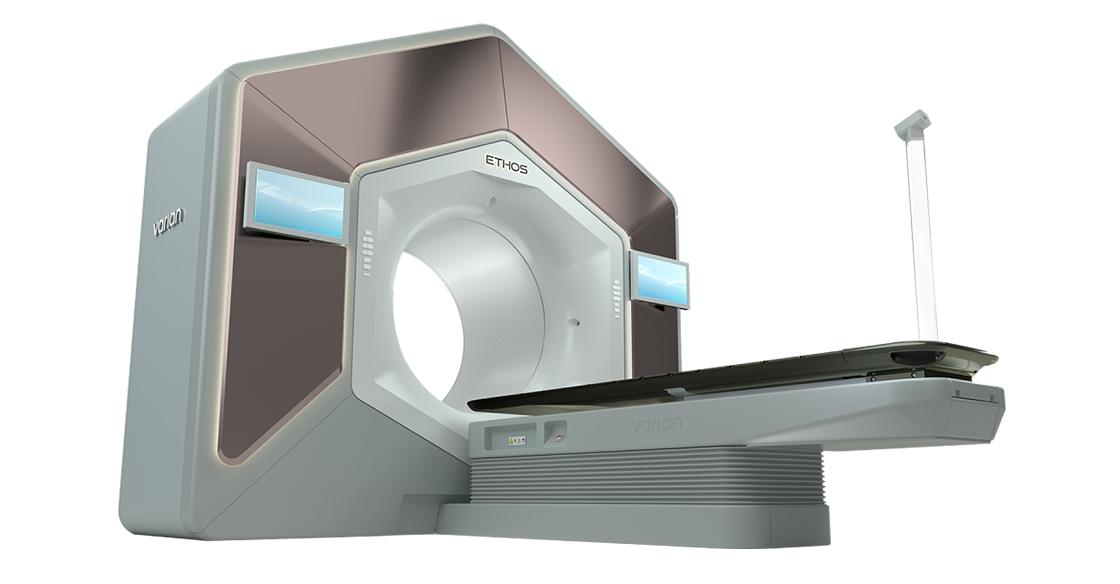
Article originally published by Saltwire.
Nova Scotia is now home to a cutting-edge new cancer imaging and treatment machine that combines incredible accuracy with artificial intelligence to offer fast and more precise therapy.
Dr. James Robar, chief of medical physics with Nova Scotia Health, said this is the culmination of 20 years of work together with the manufacturer Varian Medical Systems.
“We got our first research collaboration with Varian in 2003,” Robar said to assembled media on Monday after a news conference held at the Halifax Convention Centre to announce the development.
“We've had multiple partnerships with Varian and there are even technologies in Varian platforms that were pioneered here in Halifax by researchers and graduate students and so this is really a natural development in the evolution of our relationship.”
Robar said diagnostic imaging and treatment of cancer has progressed a long way until it is now possible to target specific tumours with radiation shaped so precisely that surrounding tissue is not damaged, but as treatment progresses, tumours shrink or grow and change shape, the patients may lose or gain weight or experience swelling and the targeting needs to be adjusted.
“Imagine being a patient, maybe from Halifax, or maybe from Yarmouth or Amherst or Antigonish, and today we would say to that patient 'well, you need radiation treatment and you're going to come to us for about a month to have daily treatments,'” Robar said.
“That could be quite typical, actually, (or) it could be longer.
“Now, imagine a technology that can compress that month of treatments through improved precision and accuracy into one to five days. We could say to that patient, 'yes, you have to come for treatment but we're going to cap this off by the end of next week.' Absolutely transformational.”
The Ethos machine will perform imaging and use AI software to plan and perform adaptive treatment, taking changes into account and significantly reducing the time patients have to endure it.
Robar repeatedly called the Ethos technology “game-changing.”
“We have some experience with the technology already,” he said. “This is actually the latest generation of a treatment platform and so we do have some early evidence to see what might be made possible with this and it's really opening up brand new work flows and new processes and ways to treat cancer patients.”
The machine potentially reduces the number of daily “fractions” or small doses of radiation, and makes treatment available to patients faster, so they are not waiting weeks to begin radiation therapy, he said.
Chris Toth, CEO of Varian Medical, pointed out that traditional delivery of radiation therapies lead to toxic exposures to other tissues, leading to conditions that can leave some requiring medications and other factors that affect their quality of life.
“When you have a technology that can reduce the number of treatments and every day reshape the dose to make sure that the maximal amount to get to take care of the tumour is delivered but then avoid healthy tissue, you're not only eradicating the disease but you're also improving the quality of life and reducing toxicities.”
Robar said the machine is now installed at the QEII Health Sciences Centre.
“We have been working feverishly with it over the past couple of weeks to generate some early results. We're going to be presenting that at the largest trade show and conference a week from now in partnership with Varian. Very excited to be leaders in this.
“So, yes, it is here. We have a lot of work to do but we can see the path from A to B very clearly and it's going to be an extremely exciting and productive year coming.”
He also said the treatment is not yet approved by Health Canada, so the Ethos machine will be used for clinical trials before becoming a standard of care. He said he hopes that will be within a year or so.
“We are pioneering these new work flows that I described in concert with Varian so that when it is Health Canada cleared we can hit the ground running,” Robar said.
Toth said it's always important when you have a strong hypothesis founded in science that has support in foundational literature, that manufacturers and partners run responsible clinical trials.
The first of two will start in a couple of weeks comparing the technology to the status quo treatments.
“And we're going to be able to do that very directly to elucidate the advantages of this exquisite imaging on this platform as well as adaptive work flows,” Robar said. “So, we're getting started right away. We're recruiting patients. Our first study will have 30 patients.”
The study will focus on breast, liver and lung cancers, he said. A second clinical trial to follow later will focus on head and neck cancers.
Nova Scotia is the first province in Canada to have this version of the platform.
Provincial Health and Wellness Minister Michelle Thompson said this is obviously going to make a difference in patient outcomes.
“For this to be first in Canada (and) to have impacts around the world, in terms of the care that we deliver here and the research, I think we as Nova Scotians should be very proud and encouraged by the work that happens here every day,” Thompson said.
Acquisition of the Ethos machine was supported by $12 million in funding from the province, $8 million in donations through the QEII Foundation's We Are campaign and the BMO Ride for Cancer event, and in-kind contributions from Varian.